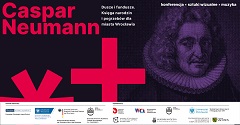Caspar Neumann. Souls and Funds. The Book of Births and Funerals for the City of Wrocław
Grzegorz Joachimiak
Monday, November 15, 2021

We have received the following from Grzegorz Joachimiak (RISM Poland, Wrocław):
Caspar Neumann (1648-1715) is a unique figure in the history of Wrocław in the context of science and art, especially concerning demographic statistics and the fascination with death. Throughout history the idea of vanitas has most often increased its intensity in border situations and in times of pestilence and uncertainty, as it is now during Covid-19. Climate, ecological, and medical problems contribute to the image of social uncertainty with almost equal intensity, sometimes causing a sense of helplessness and loneliness. The language of art allows us to understand many of these issues by focusing them through the lens of visual and musical arts.
The project “Caspar Neumann. Souls and Funds. The Book of Births and Funerals for the City of Wrocław” aims to encourage common reflection on these issues, guided by members of the Academy of Young Scholars and Artists as well as invited researchers and artists. The project’s originator and co-organiser is Dr. Grzegorz Joachimiak from the Institute of Musicology at the University of Wrocław.
In October 2021, the Ossoliński National Institute in Wrocław held an exhibition, two concerts, a scholarly conference, and preliminary sociological research. All materials are available on the website of the Academy of Young Scholars and Artists.
The conference was entitled “Tables of birth and death for the city of Wrocław. A new reading of Caspar Neumann’s (1648-1715) legacy in the interdisciplinary perspective / Tablice narodzin i śmierci dla miasta Wrocławia. Nowe odczytanie dziedzictwa Caspara Neumanna (1648-1715) w perspektywie interdyscyplinarnej”. It was recorded and the papers (some in Polish, some in English) are available on YouTube.
The presentation by our colleague Grzegorz Joachimiak (RISM Poland) examined Neumann’s legacy through the lens of his poem “Liebster Gott, wenn werd ich sterben?” which was set to music by several composers, including Johann Sebastian Bach (BWV 8).
For more information and a project description, please see the website of the Institute of Musicology, University of Wroclaw (in Polish) and Przegląd Uniwersytecki (in English).
Share Tweet EmailCatégorie: Collections de bibliothèques

